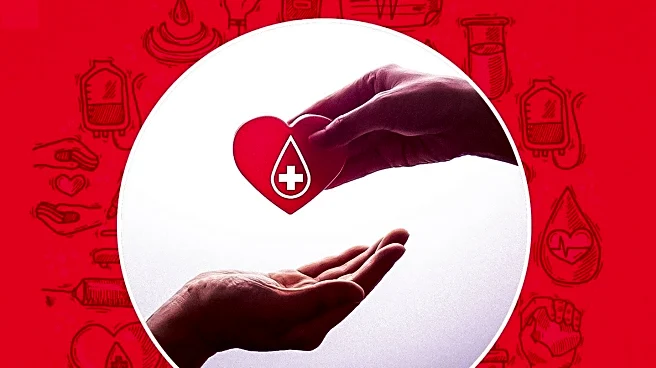What's Happening?
Healthcare providers emphasize the importance of knowing one's blood type, which can be crucial in medical emergencies and for understanding health risks. Blood types are categorized into eight groups based on the presence of ABO and Rh antigens. To determine blood type, individuals can opt for a clinical test conducted by a doctor, donate blood, or use an at-home blood test kit. Clinical tests involve forward and reverse typing to identify the specific blood type. Donating blood is a free method, though results may take weeks. At-home kits provide quick results by analyzing blood samples on a card. These methods ensure individuals have access to vital health information.
Why It's Important?
Knowing one's blood type is essential for medical emergencies, as it can affect transfusion compatibility and risk factors for certain conditions. This information is vital for healthcare providers to administer appropriate treatments quickly. Additionally, understanding blood type can inform individuals about potential health risks, such as susceptibility to certain diseases. The availability of various methods to determine blood type, including clinical tests, blood donation, and at-home kits, ensures accessibility for all individuals, promoting better health management and preparedness.
What's Next?
As awareness of the importance of knowing one's blood type grows, healthcare providers may increase efforts to educate the public on how to obtain this information. Blood donation centers might streamline processes to provide quicker results to donors. Additionally, advancements in at-home testing technology could make these kits more accurate and user-friendly, encouraging more people to use them. Healthcare policies might also evolve to include blood type testing as a standard part of medical check-ups, ensuring widespread access to this critical health information.
Beyond the Headlines
The emphasis on knowing one's blood type highlights broader issues in healthcare accessibility and education. It underscores the need for individuals to be proactive in managing their health information. This trend may lead to increased demand for transparency in medical testing and results, pushing healthcare providers to innovate and improve service delivery. Furthermore, it raises ethical considerations about the privacy and security of personal health data, especially with the use of at-home testing kits.










